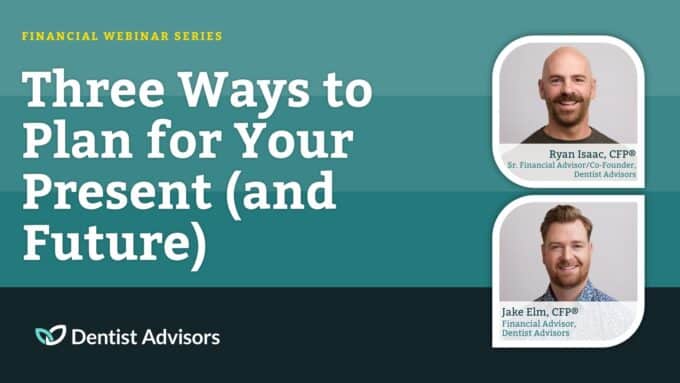TL;DR – Listen to the article post:
With our first-ever Dentist Money Summit coming up this month, using money as a tool to live a rich life has been top of mind here at Dentist Advisors.
Morgan Housel has written that, for him, the highest form of wealth is the ability to wake up every morning and say, “I can do whatever I want today.”
Happiness is a complicated subject because everyone is different. But if there’s a common denominator in happiness — a universal fuel of joy — it’s that people want to control their lives. To be able to do what you want, when you want, with whom you want, for as long as you want, is priceless.
This echoes a thought I’ve heard a few times which is that wealth is measured on a calendar, not a calculator.
I think the majority of us agree with and understand this principle. The most common response when I ask people why they want to retire or become financially independent is, “I want to do what I want when I want.”
Great answer. One of money’s greatest intrinsic values is it can give you the freedom to do what you want.
However, the natural next question that begs to be asked is, “So, what do you want to do?”
Silence.
This is where people struggle to come up with an adequate answer. Hardly anyone has thought with specific, vivid details of what they’d do if money wasn’t a restraint. Sure, most people will say something general like they want to travel more or spend more time with their kids. But very few have a specific idea of how they’d fill their time if they didn’t have to work to make money.
If you’re going to work so hard to accumulate wealth to give you the freedom to control your time, you should probably know what you want to do with that time.
What does your rich life look like?
Now, there are plenty of people working to become financially independent, not because they necessarily want to change their lifestyle or stop working, but because they want the option to do so. Which is valid.
There is a difference between working hard because you want to and working hard because someone else said you had to. Even if you’re doing the same work, the independence to do it on your own terms changes the way you feel about the work — just as sleeping in a tent is fun when you’re camping but miserable when you’re homeless.
Five-year-old Franklin Roosevelt once complained that his life was too dictated by rules. So his mother gave him one day free of structure to do whatever he pleased. His mom wrote in her diary that day: “Quite of his own accord, he went contently back to his routine.”
Money itself isn’t the goal; it’s simply a means to an end. It allows you to pursue whatever you’re passionate about.
Too many people treat their personal finances the same as corporate finances. While the purpose of corporate finance is to maximize earnings at all costs, personal finance seeks to maximize happiness and life satisfaction. The goal of personal financial planning isn’t to stockpile the largest amount of money by the end of your life, it’s to use money as a tool to live your best life.
One of the longest studies on human happiness started in 1938 and followed the lives of two groups of men. The first group began participating in the study when they were sophomores at Harvard and the second group was boys from Boston’s poorest neighborhoods. Known as the Harvard Study of Adult Development, it tracked everything about these men over decades—from their health and their careers to their relationships with others.
After analyzing the lifetimes of data, the researchers came to what may seem like a surprising conclusion:
“Close relationships, more than money or fame, are what keep people happy throughout their lives.”
Although the two groups of men had varying levels of career success ranging from a President of the United States to a high school janitor, the researchers found that the quality of one’s relationships was more predictive of happiness than any other factor. The study eventually expanded to include their wives and children and the findings were the same.
According to Robert Waldinger, the 4th director of the study, relationship quality was even a better predictor of overall health than many traditional health markers. In his TED Talk he says:
“When we gathered together everything we knew about them about at age 50, it wasn’t their middle-age cholesterol levels that predicted how they were going to grow old. It was how satisfied they were in their relationships. The people who were the most satisfied in their relationships at age 50 were the healthiest at age 80.”
A lot of personal finance is dedicated to figuring out how to effectively keep and grow your money, which is very important and necessary. However, study after study shows that happiness isn’t correlated to how much money you’ve accumulated, but rather how you choose to spend the money you have.
What’s interesting is the spending choice that has the biggest impact on a person’s happiness is how much money they spend on others. One study revealed that those who spent as little as $5 on someone else throughout the course of their day were happier at the end of the day than those who only spent money on themselves.
Spending money on other people seems counterproductive to the goal of building wealth, but there are plenty of financial decisions that will have a negative impact on your net worth but a positive impact on your life.
Rather than trying to be the richest person in the cemetery, we would all benefit from spending a little more time and money on building quality relationships with the people we care about.
As Mr. Carson from the show Downton Abbey once remarked:
“The business of life is the acquisition of memories. In the end, that’s all there is.”
I recently read a story about a financial advisor who has a client that actually gets angry when hearing about portfolio returns or benchmarks. As a fellow financial advisor, I can confidently say this mentality is rare. But none of that stuff matters to this particular client. All he cares about is whether he has enough money to keep traveling with his wife. That’s his only benchmark.
“Everyone else can stress out about outperforming each other,” he says. “I just like Europe.”
Maybe he’s got it all figured out.
Sources:
“The Highest Forms of Wealth.” Collab Fund, Morgan Housel, 20 July 2021
“Harvard Second Generation Study.” Harvardstudy. Accessed 22 May 2024.
“The Benefits of Giving.” Elm, Jake, Money Talks, 30 Nov. 2020
If Money Doesn’t Make You Happy Then. Accessed 22 May 2024.
“Internal vs. External Benchmarks.” Collab Fund, Morgan Housel, 26 Oct. 2021
The allure of complexity
Few things in life grab people’s attention like an investment pitch. These “sure-fire” opportunities come from different sources: a rich neighbor, a brother-in-law, a “good guy” from church, a group of friends on a trip, etc. We hear about these conversations all the time from our clients who are intrigued by the promise of big returns.
If it sounds too good to be true, it usually is. Risk and return are married in investing. If someone is coming to you with a “risk free” idea, then you should probably turn and run the other way. As an investor, you are compensated for taking risks. To distract from that reality, the pitch often includes something eloquent about the complexities of the investment—going through the intricacies of the idea, and using terminology you have never heard but sounds really smart. “I might not know what they are saying, but they obviously do so I should listen.”
As an advisor, the first question I always ask clients is, “Can you explain it to me?” As a general rule of thumb, if you can’t explain an investment strategy to someone else in a few sentences then it probably isn’t a good idea, or you need to go back and ask a lot more questions before putting your hard earned dollars into something you can’t control. Complexity sells, but doesn’t usually perform.
Aggressive tax strategies
People hate taxes. If I had a dollar for every time I’ve heard some version of, “I hate taxes. How can you help me get out of paying taxes?” I’d already be retired. I’ve never met a single person who likes to pay taxes. My favorite response to this came from a CPA who once told his client, “I’d be happy to pay your taxes for you. If you pay me more, that will be a business deduction for you and I’ll gladly pay the taxes for you.”
Now it is true there are tax strategies that can save you money on your tax return. You should be taking advantage of these, but dentists can often get duped by looking for more creative ways to save on taxes. They can be all too willing to buy an extra piece of equipment or a new vehicle for the write off. If there is a legitimate business reason to make a purchase then I’m on board. But in a lot of cases for dentists, the motivation is often driven by the ability to save on taxes whatever the cost. Remember that if something is 30% off, it’s also 70% on.
By seeking more “complex tax strategies” dentists tend to get in with the wrong crowd. As a dentist, you are in the public eye. There are sharks in the water. People know dentists make money, and they are willing to sell you anything to get to it. There are entire marketing campaigns for “investments” around “complex tax strategies”. I can’t use air quotes enough in this section. Tax-saving strategies usually aren’t real tax savings where the taxes go away. For the most part, you’re just shifting your payment to Uncle Sam from now until later.
Keeping up with the Joneses
As a dentist, you typically don’t graduate from dental school until you are in your late 20s to early 30s. You watched your contemporaries start earning money and purchasing homes while you were still surviving on Ramen noodles and racking up six-figure student loans. It’s impossible not to feel behind when you first start.
One of the worst ways you can get duped is believing you somehow have to keep up with the spending habits of people of similar incomes in your early career. If you are comparing incomes with people during the beginning of your career, you are not comparing the right numbers. They probably bought their homes when prices and interest rates were half of what they are now, or with equity they built over a decade. They probably don’t have $400k in student loans, and they probably aren’t paying on a $1M practice loan. Don’t worry you will get there, but patience is hard.
I know it may feel like everybody in their 30s is already in their dream home, has millions in their investment accounts, and have their lives figured out. The secret is that they actually don’t, and you don’t have to either. Remember spending is what you see, wealth is what you don’t see. The most important thing you can do early in your career is discipline yourself enough to be able to save between 15-20% of your income.
Searching for wealth outside of dentistry
Sometimes I joke that going to dental school is the most expensive real estate license you’ll ever get. It’s amazing how many dentists only a few years into their careers are looking to get out of it. This is not unique to dentistry though—it’s the age old feeling that the grass is always greener on the other side.
There are no magic beans, silver bullets, or home run investments that will help you retire at 40. Despite this, too many people run toward real estate, permanent life insurance, DSO offers, and outside business “opportunities” as if it will solve all of their problems. The truth is that pursuing these alternative investments too early in your career can be detrimental to your long term success.
Dentistry is an amazing career with incredible earning potential, and a chance to build generational wealth. Does it have its downsides? Yes, but so does every profession. Average dentists tend to compare their situation to the top 5% of other professions, but they never seem to compare their situation to the average majority of other professions. You compare yourself to the successful business owner, but not to the 90% of startups that fail within the first year. A great dentist getting average returns tends to do much better than an average dentist getting great returns.
I hope you made it through April Fools unscathed. And I hope you’ll think twice before getting tricked into these common money mistakes

Jake Elm, CFP® is a graduate of Utah Valley University’s nationally ranked Personal Financial Planning program. As a financial advisor at Dentist Advisors, he provides dentists with fiduciary guidance related to investments, debt, savings, taxes, and insurance. Learn more about Jake.




